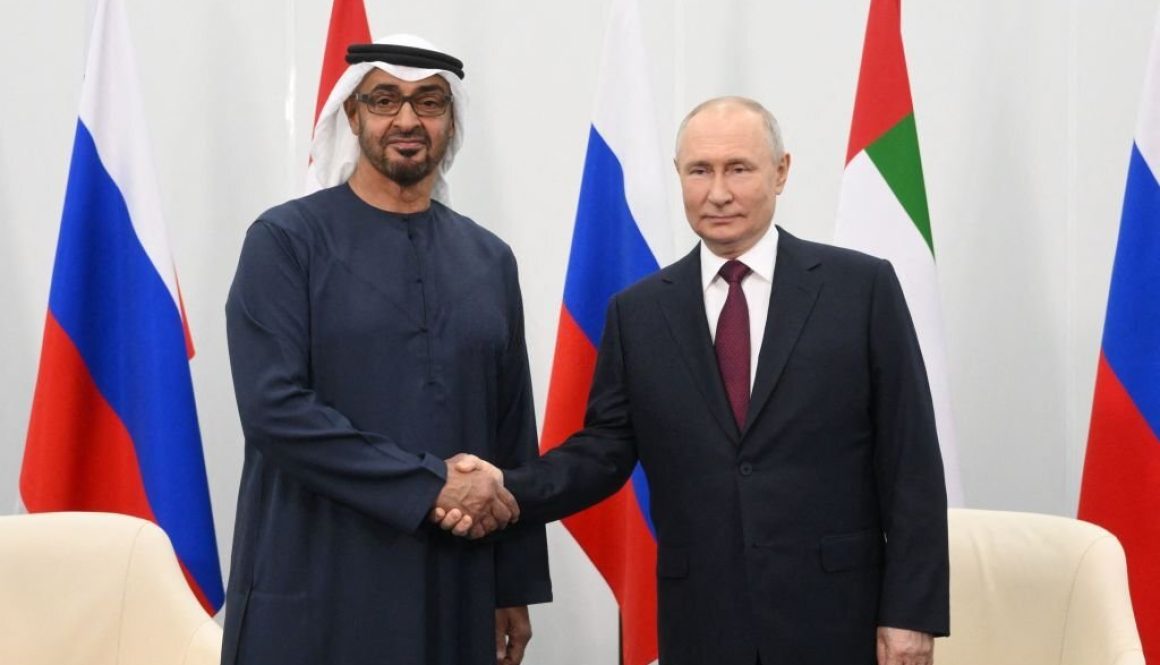Balance of Power: UAE between the U.S. and Russia
In the middle of June, Mohamed bin Zayed, the president of the United Arab Emirates, attended Russia’s largest business summit. The UAE president stopped at the nation’s pavilion at the St. Petersburg International Economic Forum (SPIEF) while on a business visit to Russia.
The UAE is this year’s “guest of honor” country at SPIEF, represented at the four-day event by the ruler of one of the seven Emirates that make up the Arab federation along with UAE economy minister Abdullah bin Touq Al Marri. “I am happy to be here today with you, Your Highnesses, and we want to build this relationship and we put our trust in you to do it,” Sheikh Mohammed told Putin.[1]
SPIEF, which was previously one of Russia’s main international summits, was held in Putin’s hometown and place of childhood. But since the Ukraine conflict, Western countries have avoided the event for fear of upsetting the US and Europe, which are keen to isolate Russia on the global arena. For the UAE, this is a “calculated risk” that it is willing to take, part of the Gulf state’s policy of de-escalation and dialogue in an increasingly polarized world, a top UAE official told CNN.[2] “This polarization must be broken,” said Anwar Gargash, diplomatic adviser to the UAE president.
While Sheikh Mohamed also spoke with numerous Western leaders, according to Gargash, it was crucial for him to hear from President Putin so that he could support the group efforts of the international community to overcome the current divide.
“We’re trying to hear from all sides,” Gargash said. He described the UAE president’s visit to Russia as part of that policy. A “positively calculated risk” to ensure that channels remain open with Putin. In a televised meeting, Putin thanked Sheikh Mohamed for his efforts to “resolve the humanitarian issues during events in Ukraine related to the prisoner exchange.”
The UAE’s state-run news agency said Sheikh Mohamed spoke to Putin about accelerating efforts to “reduce the humanitarian impact of the crisis and support prisoner exchange initiatives on both sides.” Gargash said that instead of taking the “conventional view of avoiding the crisis that hit everyone … we really have to think about the positive difference.”[3]
Being an opportunist between the two main powers that are eager to pay the UAE a lot to get closer to the oil-producing nation, the UAE is likely to be “testing the waters” on what is being done with both Russia and the US. Even the UAE itself has a significant diplomatic impact on Russia. Brittney Griner, an American basketball player, was freed in exchange for Russian weapons dealer Victor Bout in December thanks to mediation by the UAE.
The UAE’s policy towards Russia has drawn warnings from the US that individuals and institutions that enable Russia to circumvent sanctions risk losing access to G7 markets. Dina Esfandiary, senior advisor for the Middle East and North Africa at Crisis Group, said the UAE builds influence globally through mediation. “Given maintaining relations with Russia and also talking to the US, it is in the right position to do this,” he told CNN.
The UAE alone hosts 5,000 US troops at Al Dhafra airbase outside its capital, Abu Dhabi.[4] Over the past three years it has developed close ties with Israel, becoming one of its closest allies in the Middle East. Meanwhile, on the other hand, the UAE’s bilateral trade with Russia increased by 68% to $9 billion in 2022, most of Russia’s exports to the UAE, although the UAE and US trade amounted to $23 billion in 2021.[5]
One year since Russia’s invasion of Ukraine, the Gulf nation’s balancing act demonstrates a broader Middle East-wide policy of international neutrality, even as a country as powerful as the United States has failed to persuade its Middle Eastern allies to join the West against such adversaries. Russia and China.
Economic strength, especially oil can be said to be the main capital for Middle Eastern countries today, especially with almost all of the world’s oil being produced and regulated by Arab countries. An example that the UAE dared to take risks to establish relations with Russia in the midst of the turmoil of the Ukrainian war is an attempt to increase its strength in the international sphere and also balance the forces entering Middle East politics by being neutral.
This can be an example of the balance of power in the world today. The theory of Balance of Power describes the behavior of states in the international system where the international system is anarchic, each state is concerned about security and survival.[6] There is no global government and international law is only moral law. For this reason, as a country with a high bargaining position, the Middle East group of countries can influence and not be affected by powerful countries and can act as they wish.
[1] Becky Anderson dan Mostafa Salem, “UAE says Russia ties are a ‘calculated risk’ in an increasingly polarized world”, CNN, 16 Juni 2023, https://edition.cnn.com/2023/06/16/middleeast/uae-russia-st-petersburg-mime-intl/index.html
[2] Ibid.
[3] Ibid.
[4] “Shared Commitment to Regional Security”, UEA USA United, https://www.uaeusaunited.com/stories/shared-commitment-regional-security
[5] “UAE – Russia Bilateral Trade Up 68% In 2022”, Middle East Briefing, 20 Februari 2023, https://www.middleeastbriefing.com/news/uae-russia-bilateral-trade-up-68-in-2022/
[6] Naresh Giri, “Balance of Power Theory in Present International System”, Department of International Relation and Diplomacy Faculty of Humanities and Social Science Tribhuvan University, 12 Februari 2021, DOI: 10.13140/RG.2.2.19997.64489
